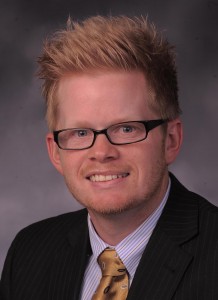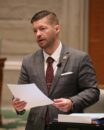JEFFERSON CITY, Mo. — Perception trumps reality in politics. That’s what Rep. Caleb Rowden, R-Columbia, told voters during a candidate forum during the election. With the coming departure of Rep. Noel Torpey, who will be resigning to serve as chief lobbyist for Fair Energy Rate Action Fund (FERAF), the sophomore legislator is now the point man for the House and its 2015 push for new campaign finance limits.
“I think there’s both a perception problem and a reality problem,” said Sean Nicholson, Executive Director of ProgressMO, a liberal think-tank and vocal proponent of campaign finance reform. “Regardless of whatever the impetus is, there really is no reason not to move forward with comprehensive reform. Ask any voter, and they’ll overwhelmingly support it.”

Rowden briefly came under fire during the early days of his campaign for taking monetary donations from Reynolds American, a tobacco company, at the same time he was pushing a bill that would bar the sale of e-cigarettes to minors, but also forbade the devices from “being regulated like tobacco.”
Gov. Jay Nixon vetoed the bill, and Rowden touted it as a measure to protect children from the new cigarettes. Rowden denies Reynolds donations led him to file the bill, but acknowledged that the experience taught him the valuable lesson of perception versus reality.
“In reality, would a 12-pack of Buffalo Wild Wings from a lobbyist change my or anybody else’s vote on a bill? Probably not,” Rowden said. “But the perception as it relates to lobbyists gifts is not a good one. We lose that debate every time.”
Missouri repealed the last of its campaign donation limits in 2008, ushering in the unprecedented campaign finance laws alive and well today. Under current law, Missouri remains the only state in America with both unlimited individual donations to campaigns and unlimited gifts from lobbyists. Rowden’s bill is aimed at that problematic combination, which Secretary of State Jason Kander has taken to calling “the real voter fraud” in Missouri.
“Even if you can’t get a full ban, which is what I support, that transparency piece has to still be there,” Rowden said. “That way at the end of the day if we take a gift, it’s out there, and people know, and we have to run on that record.”
Torpey, long identified as a moderate Republican capable of leading delicate negotiations, surrendered his claim to the campaign finance issue when it was announced just last week that he would be resigning his House seat to lobby on behalf of FERAF. Staff for House Speaker-elect John Diehl, R-Town and Country, confirmed that they are working with Rowden on his bill to craft language that the majority of House members will support.
Rowden may be the ideal candidate to carry what is likely to be one of the most talked about bills of the session. Moderate voters in Rowden’s Columbia district are likely to embrace new limits on gifts and donations from lobbyists, and Rowden’s own experience with e-cigarettes, as a cautionary tale of “perception versus reality,’ may prove the ideal narrative.
The young Columbia lawmaker says the strategy is to pass ethics reform closing the “revolving door” between lawmakers and lobbyists, increasing reporting requirements on donations received during the legislative session, an end to House “issue development” committees and new requirements for gubernatorial appointments.
Rowden will file several pieces of legislation, which he is hoping to finish this week. Apart from several “narrow, tailored” bills, Rowden will also file a larger omnibus reform package. Rowden said his bills would deal largely with rules relating to lobbyists gifts and donations, and not with campaign finance.
“There is a fairly strong legal argument out there that you can’t restrict free speech in that way,” Rowden said. “Nothing is off the table, and I personally haven’t taken campaign finance off the table if there’s a legitimate and broad interest. But that’s an uphill fight and part of our strategy is being realistic about something we can introduce that’s not just good on paper but that can also become law.”
Collin Reischman was the Managing Editor for The Missouri Times, and a graduate of Webster University with a Bachelor of Arts in Journalism.








